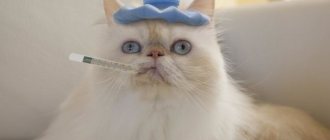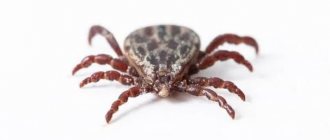Many cat owners experience scratching in their pets. Often this is just a symptom that indicates some more serious disease in the animal. In the initial stages, scratching does not cause any particular problems for the cat, and owners often do not pay attention to it.
This is wrong, because many diseases are curable only in the first stages, and some skin infections of cats can be dangerous to humans. Let's look at why a cat may scratch, how to help your pet at home, and in what cases you should consult a doctor.
The procedure for making a diagnosis for skin problems in a cat
The veterinarian begins the appointment from afar - asks the owner about the conditions of the pet’s keeping, about nutrition, about changes in behavior. Only after this the specialist examines the animal. First, the doctor assesses the general condition of the skin and coat and pays attention to the location of the problem. So, scratching near the ears of a cat may indicate that the problem lies inside the ear. Severe itching is caused by otodectosis - ear scabies.
If lichen is suspected, Wood's lamp diagnostics is used. The skin and fur are examined under ultraviolet light in a completely dark room. Some fungal colonies will glow bright green. Even if there is no glow, a dermatologist can take a culture for the fungus.
Deep skin scrapings and microscopy are needed to detect subcutaneous microscopic mites in sarcoptic mange. But again, a negative scraping is not a sufficient basis to exclude the diagnosis.
In general, diagnosis in dermatology is complicated precisely because most diagnoses are confirmed empirically - the response to therapy is assessed. Some external parasites can be seen upon careful examination - haietiella, lice-eaters, fleas. But most often it is not possible to detect fleas. 90% of the flea population does not live on an animal, but is found in the environment. Those fleas that are on a cat cleverly hide in the thick undercoat and are often swallowed by licking and biting.
The dermatologist usually tells you how to treat your cat's scratching, and then begins to rule out the causes of itching one by one, starting with the most obvious ones. And the first recommendation is always treatment for fleas and other external parasites for at least three months.
Treating scratches at home
If a cat scratches itself until it bleeds, the first step is to treat the wound so that it does not get infected. Regular human ointments are suitable for this.
To avoid further scratching of the skin, the cat should trim its claws and cover the problem area with something (for example, put a special collar or vest on the animal).
If a doctor has diagnosed lichen, the sick animal must be isolated from healthy ones. The fur next to the affected area is shaved off. The affected area is treated with ointments.
If an animal is taking any anti-inflammatory or immunosuppressive drugs, they should be stopped for a while so that the body has the strength to cope with the fungus.
The room in which the cat lives, as well as all objects with which it comes into contact, must be disinfected. Treatment of lichen can take quite a long time, but if its initial stages are detected, the animal will fully recover.
A special diet will help overcome food allergies. A product that causes a negative reaction should be excluded from the diet. You can also purchase commercial food for cats prone to allergies.
Atopic dermatitis can also cause itching. This is also an allergic reaction of the cat’s body, but it is impossible to isolate the exact allergen and completely eliminate it. Atopic dermatitis cannot be cured, but with the help of medications, all negative manifestations of allergies can be eliminated.
If a cat is suffering from a bacterial infection, the first step is to use various ointments. If an animal develops ulcers, the doctor will prescribe a course of antibiotics.
If the disease becomes chronic, the veterinarian takes microbiological tests. This is necessary to prescribe the most effective treatment for this type of bacteria.
When do you need veterinary help?
Often, scratching is almost harmless and does not cause the animal much discomfort. The owner may not even immediately notice that something is wrong with the pet. Problems begin when bacteria get into the wound. In this case, an abscess may form on the skin. In some cases, without timely treatment, the area of scratching may increase.
We recommend the article: What can cause a cat's paw to swell?
If an animal scratches a small wound once, there is no need to sound the alarm. Perhaps the cat just overdid it. The wound should be treated and the pet should be monitored.
In what cases should you take your pet to the veterinarian:
- The cat scratches the same place for a long time until it bleeds.
- The area of scratching increases.
- The wound oozes pus or does not heal.
- Scabs form on the affected area of the skin.
- The cat's hair falls out and bald patches form.
- The animal is constantly itching.
Scratching is often one of the symptoms indicating that the animal is unhealthy. In this case, you should pay attention to the general condition of the cat. You should contact your veterinarian if the following symptoms accompany itching:
- Decreased activity or excessive agitation.
- Increased body temperature.
- Lack of appetite.
- Nausea, vomiting, diarrhea.
Scratch treatment
First of all, you need to remove the cause of itchy skin. Any veterinarian will tell you how to treat cats scratching on the neck and other areas of the body: you have to start with antiparasitic treatment. You should use modern means - they are effective and safe. You should not wash cats if you suspect a flea infestation - this is very stressful for cats, and bathing will not help get rid of parasites. If you wash off the natural fat layer from the skin, this will prevent the drops from being absorbed onto the withers, and it is the drops that most veterinarians prescribe for the treatment of parasitosis. It is painless for the cat and convenient for the owners.
Alcohol-based drops, such as Stronghold, are absorbed and evaporated very quickly - after just two hours you can stroke your cat’s fur. This is especially important if there are children in the house. "Stronghold" is convenient and has a wide weight range. If it is not possible to weigh your pet at a veterinary clinic, drops for cats weighing 2.6-7.5 kg are suitable for most adult animals.
After regular treatment with flea and tick drops, you can move on to further diagnostics, such as an elimination diet to detect food allergies.
Sometimes it takes a long time to conduct research and eliminate the problem, and you need to stop the painful process of itching as early as possible. Then antipruritic therapy is used.
Often owners are interested in what to anoint their cat’s scratches to speed up their healing. The choice of ointment depends on whether a secondary bacterial infection has developed after skin damage. You can use complex ointments with antipruritic, antifungal and antibacterial effects. But if the cat has scratches on its back, you will have to put a collar on the pet to prevent licking of the drug.
Omega-3 fatty acids, B vitamins (brewer's yeast) and trace elements such as sulfur and zinc contribute to skin healing. Fish oil, brewer's yeast or special vitamin-mineral complexes for skin and coat are added to the diet of natural-fed cats. If your cat eats commercial food, then it is enough to switch to a special diet to treat dermatitis.
Prevention
It is impossible to completely eliminate the possibility of disease and infection, but thanks to competent prevention it is quite possible to minimize the risks for your pet. Be sure to follow these recommendations:
- regularly prevent infection with endo- and ectoparasites: drops on the withers protect the animal for 4 weeks;
- the collar is valid from 2 to 6 months;
- It is recommended to give an anthelmintic to a cat that walks on the street once every 3 months, and to a pet at home - once every six months;
Regular prevention of parasite infestation, including fleas and worms, is one of the most important elements in preventing itching and sores on the neck.
Itching in a cat can be caused not only by a flea attack. If a cat scratches its neck severely until wounds appear, you should pay attention to other symptoms; perhaps the animal is infected with helminths or is affected by a fungal disease. Treatment involves eliminating the root cause and depends on the specific ailment.
Preventing skin problems in cats
Regular treatment for external and internal parasites is a prerequisite for the prevention of diseases in cats. In the warm season, it is especially important to protect your pet from fleas and ticks, and in some cases (warm climate, contact with stray animals, etc.) treatment should be year-round. You need to use safe products to which the cat is not allergic, and weigh the animals before treatment.
Healthy, well-groomed pets rarely become infected with fungal infections. Therefore, conditions of detention are important. In addition to protection from external parasites, the cat should regularly receive anthelmintic, be vaccinated in a timely manner, and for older animals an annual medical examination with blood tests is also relevant.
Balanced, nutritious feeding also helps maintain healthy skin and coat, regardless of whether you prefer natural food or commercial food. A healthy cat should have a “glossy” appearance and not suffer from year-round shedding, mats or dandruff.
Some diseases, such as autoimmune diseases or allergic reactions, cannot be predicted or prevented. In this case, the owner can do only one thing - promptly contact a specialist if the cat develops scratching or other skin problems.
Causes of itching
Owners do not always immediately begin to sound the alarm when they discover scratching on their pet. Often they believe that this is not a very serious problem. If the scratching is minor and the itching does not particularly bother the cat, the owner can completely ignore this problem. But it is worth remembering that many diseases are curable only in the first stages. Therefore, it is important to promptly find out the cause of itching and provide professional help to your pet.
Lichen
This is an extremely contagious fungal disease that is also dangerous for humans. It is easily transmitted from a sick animal to a healthy one through short bodily contact, or even through grooming items (combs, nail clippers). Without timely treatment, lichen in dogs, like in cats, can lead to serious consequences for the health of the animal.
We recommend the article: What can cause a cat's eyes to water?
The main symptoms of lichen infection:
- The coat appears unhealthy. A large number of broken hairs.
- Small bald spots appear, which the cat actively scratches. They can be found primarily on the head, neck and paws.
- Hard crusts appear on bald spots.
- Lost fur grows back very slowly.
- Dandruff appears on the skin.
- In the final stages, purulent lesions form.
Skin parasites
Fleas are a very common parasite, especially among cats that have free access to the outdoors. Fleas are quite dangerous, because their bites lead to a decrease in the animal’s immunity. The cat becomes vulnerable to various bacteria and fungi. Flea bites cause severe itching, causing the animal to constantly scratch. Particularly sensitive cats may scratch their skin until it bleeds.
Your cat can also pick up ticks, lice and coccidia. However, the animal does not have to go outside for this. The owner may well bring some parasites with him on shoes and clothes.
The main symptoms of infection with skin parasites:
- deterioration in the appearance of fur;
- severe itching;
- anxiety;
- fleas and ticks can be seen visually if you look closely at the animal’s skin.
A tick bite can lead to quite serious consequences. At the same time, the animal’s temperature may rise, loss of appetite, and decreased activity.
It is best to consult a veterinarian to remove a tick. If the procedure is performed incorrectly, parts of the tick may remain in the animal's skin, which can cause a purulent abscess to form.
Allergy
An allergic reaction can occur completely unexpectedly in any cat. Most often, animals suffer from food allergies. It often manifests itself when changing the diet or adding new foods to it. Food allergies are the easiest to identify and therefore easy to combat.
But when diagnosing non-food allergies, problems can arise. In this case, it is not always possible to determine which allergen caused the body’s negative reaction.
An allergic reaction can be caused by:
- individual food products (often chicken and milk);
- pollen and plant parts;
- flea and tick bites;
- various chemical elements contained in cleaning products and perfumes;
- dust.
Otitis
Otitis of the external ear is a serious disease that can cause many problems for the animal. Infection of the ear canals leads to inflammation. The cat constantly shakes its head and scratches its face until it bleeds.
The main symptoms of otitis in a cat:
- redness of the ear;
- anxiety;
- the cat constantly shakes its head;
- the animal scratches its ears and muzzle;
- increased body temperature;
- In the absence of timely treatment, pus may begin to leak from the auricle.
Worms
Even completely domestic cats are not immune from infection with worms. Parasite eggs can enter the animal's body through raw meat, unwashed hands, clothing, and grass. Infection with helminths leads to decreased immunity and disruption of the body.
The main symptoms of helminth infection:
- Deterioration in the appearance of the coat, scratching.
- Defecation disorder.
- The animal quickly loses weight.
- Itching in the area of the anus, which causes the animal to rub it on the floor and carpets.
- Decline in activity or, conversely, excessive anxiety.
- In advanced cases, severe shortness of breath occurs.
Bacterial diseases
Bacteria and fungi are found in small quantities on the skin of any cat. Usually, they do not cause any problems to the animal. But if the animal gets sick, its immunity is reduced, and the body is weakened, fungi and bacteria begin to actively multiply, which often leads to severe itching and scratching.
We recommend the article: What causes diarrhea in a cat?
At risk are cats that already suffer from diabetes, allergies, and hyperthyroidism. This problem often occurs in kittens.
One of the most common bacterial infections in cats is pyoderma . Its main symptoms:
- severe itching;
- peeling of the skin;
- Scabs form on the wounds;
- baldness of certain areas of the skin;
- formation of purulent abscesses.
Pyoderma is very dangerous for cats. When the first symptoms appear, you should immediately consult a doctor.
Stress
All animals experience stressful situations differently. For some, moving or even ordinary fear can lead to not entirely adequate reactions. Constant licking of the same places may indicate mental disorders of the animal.
Of course, such a diagnosis can only be made after all other possible causes of itching have been excluded during the diagnostic process. The main symptoms of mental disorders and stress:
- refusal to eat;
- a decrease in activity or, conversely, excessive excitability;
- the animal constantly scratches or licks one place.
Breeds in which this problem most often occurs: Burmese, Orientals, Abyssinian and Siamese cats.
Disruption of hormone production
Disruption of the endocrine system leads to the appearance of various symptoms, including itching and scratching. A number of diseases that cause disruption of hormone production:
- Diabetes.
- Cushing's syndrome.
- Thyroid dysfunction.
Main symptoms:
- Hair loss and bald patches.
- Dryness and flaking of the skin.
- Severe itching and scratching.
Prevention of itching: does it exist at all, and what can be done?
Itching is caused by various factors, so following a number of prevention rules will help protect your cat from scratching:
- Poison worms in a timely manner. This will also help protect children who constantly play with animals. You should not give your cat raw foods: fish, meat.
- After each walk, inspect the animal for abrasions. Treat detected wounds with iodine or other disinfectants.
- To avoid infection with parasites, the cat should not be allowed to come into contact with other animals.
- Disinfect the cat litter box regularly.
- The transition to a new food should be carried out gradually.
- Do not punish your cat for minor offenses: this will prevent stress.
At the first manifestations of inappropriate behavior, the animal must be immediately shown to a specialist. You should not self-medicate, as there are many reasons why a cat may itch.
The doctor will help not only eliminate itching and painful scratching, but also the very reason for their occurrence. It is important to pay close attention to your pet in order to recognize a possible disease in the early stages.
Cat scratching its chin
Veterinarian advice
Despite the risks of being outside, the cat needs fresh air, so you should not limit its freedom. Since infections and parasites are transmitted through hands or from other animals, preventative treatment against parasites should be carried out regularly.
Veterinarian advice:
- The animal must be kept clean.
- A good immune system will protect your cat from any infection. The key to health is proper and balanced nutrition.
- To prevent allergies, you should not include smoked and salty foods in your diet. Sweets are also prohibited.
- A change of owner or a sharp change in attitude towards a pet leads to stress and illness. A pet needs to be loved, cared for, and given enough attention.
Be sure to read:
The cat scratched its neck until it bled: what to do, what to apply, how to treat it
The cat licks and itches, but there are no fleas
A signal about the development of the disease can be constant licking of fur, scratching and excessive attentiveness to one’s appearance. Often the cat owner thinks that the pet has fleas, but when examining the fur, it is clear that this is not the reason.
Possible causes of itching:
- allergy;
- fungal diseases;
- hormonal diseases;
- hypo- and vitamin deficiencies;
- change of diet.
The cat licks itself vigorously and goes bald
Sometimes itching occurs for psychogenic reasons. Increased licking and scratching occurs when the animal is stressed. This is often observed when an individual requires mating. Taking sedatives will help calm your pet.
Cat licks after sterilization
Cats always try to lick wounds, sores and other skin lesions. After sterilization, a seam remains, which itches and itch, so the animal scratches and licks it. To prevent bleeding or other serious complications, a surgical collar is placed on the cat.
What to do if your cat is constantly licking
It can be difficult to diagnose why an animal constantly licks itself. First, the cat is checked for fleas, then it is analyzed whether the diet or care products have changed.
With a skin disease, the animal often shakes its head and licks itself until it bleeds. Only a doctor can diagnose the disease, so the pet must be taken to the clinic immediately. Based on the scrapings taken, they will be able to identify mites or fungal spores.
The cat itches, chews itself, constantly licks itself: is this normal?
If an animal itches due to severe itching, then with sharp claws it damages the skin, causing infection.
During severe itching, severe irritation of pain receptors occurs, because of this the animal begins to lick and chew itself. The skin on the affected area turns red and wounds appear. The reasons for this condition are different. To relieve the symptom and understand what to do, the pet must be shown to a doctor.
When it's ok
Cats are clean creatures. They wash themselves after sleep and after eating. If your pet eats natural food, then after licking the fur it will smell like the food it ate.
The smell of eaten herring is especially strong. If the animal licks itself too much, then it needs a medical examination.
Signs of a pathological condition of an animal
The painful condition can be determined by itching of the skin or ears. With skin itching, you can notice how the cat itches a lot and tries to bite the source of its anxiety from under the skin with its teeth.
When the itching is localized in the ear, the cat tries to stick its paw deep into it to scratch.
During this period you may notice:
- constant scratching of the body with a plaintive meow;
- pronounced biting of the skin;
- hair loss, deterioration of its appearance;
- the appearance of dandruff, oily scales;
- the skin is covered with ulcers or red rashes in the form of small spots;
- parasites or their excrement are visible on the skin.
It is easy to help an animal if you notice deviations in behavior in time and take him to the clinic. An advanced disease is more difficult to cure.











